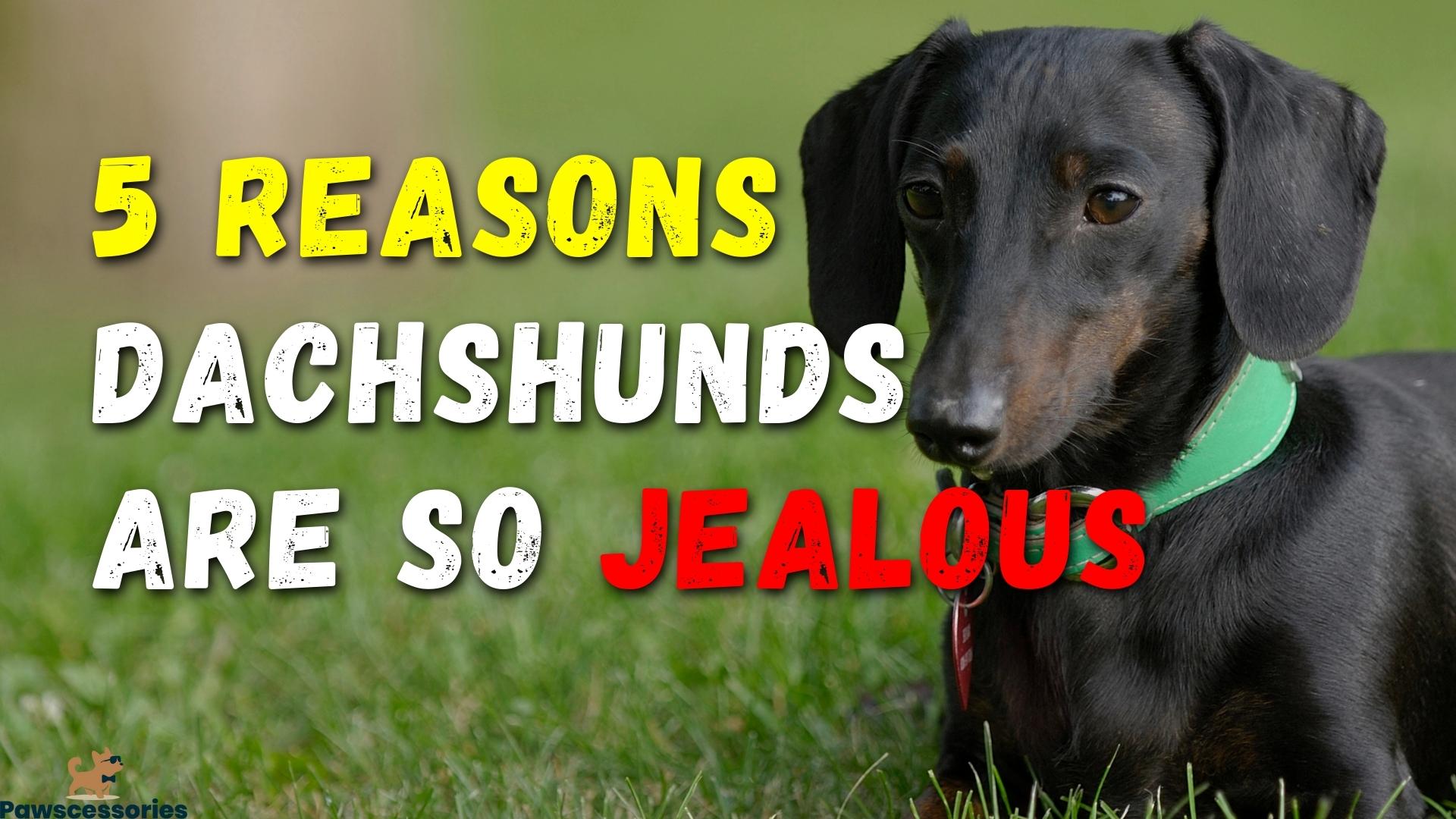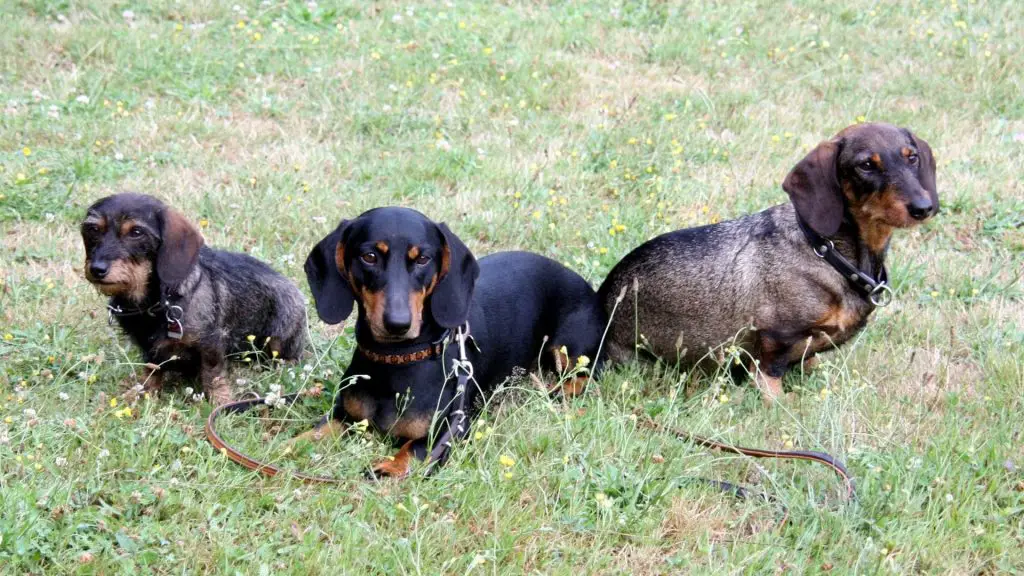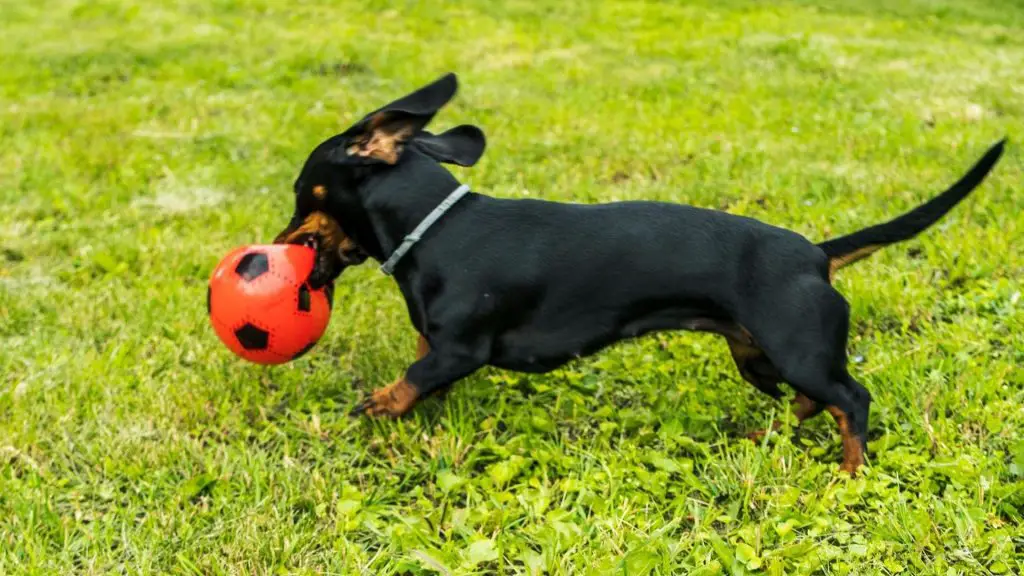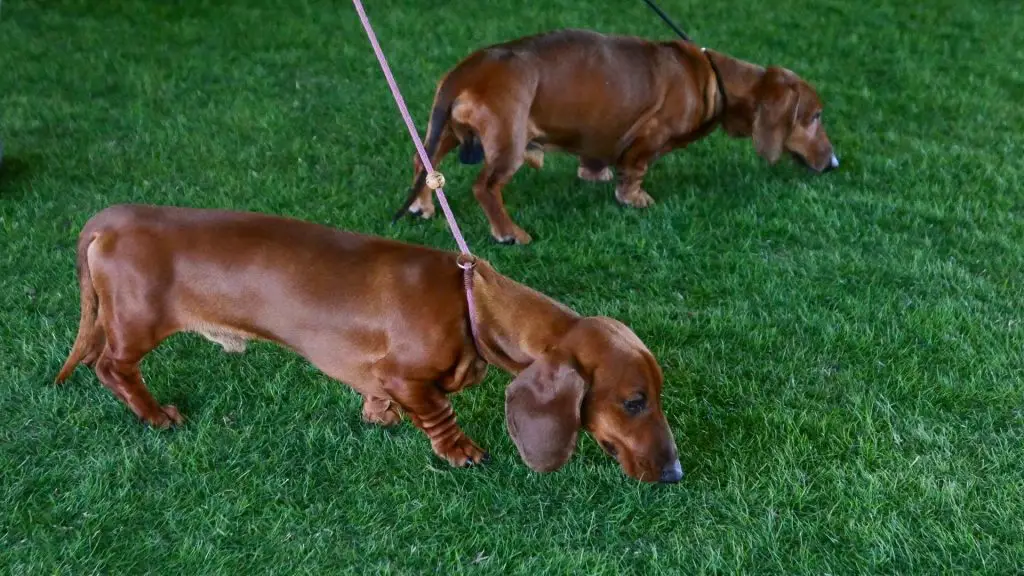Pawscessories is reader-supported. When you buy via links on our site, we may earn an affiliate commission at no cost to you.
Learn more.
You give your dachshund an unlimited supply of love yet you still find them getting so jealous whenever you’re around a new dog, strangers, or have company over.
What gives? Why on earth are dachshunds so jealous?
Are Dachshunds Jealous?
Dachshunds are often very jealous because they’ve been showered with love and attention without any competition. As soon as competition presents itself, whether that’s another dog, a baby or another adult, they may act out in an attempt to regain your sole attention.
Unfortunately, a dachshund that shows jealousy can often turn aggressive if not trained out of their jealousy.
In this post you’ll discover the top 5 reasons why dachshunds act so jealous, some of the dangers associated with an overly jealous doggo as well as the top 6 tips to help curb this behavior (tip #1 is hands down the most important!).
Let’s dive right in.
Table of Contents

Top 5 Reasons Why Your Dachshund Is So Jealous
1) Unknowingly Trained To Be
A jealous dachshund, if not being aggressive or loud, is actually one of the cutest things going.
And because of this, you might have unknowingly trained them to be overly jealous.
They may have shown their jealousy by pawing at you, doing a trick in an attempt to get your attention, or sitting on you.
Any time they acted jealous, you likely gave them love and affection for being such a cutie.
Dogs are really good at picking up on patterns of behavior. So when they notice after a few times of acting a certain way, they get rewarded with love and attention, they want to repeat that behavior often.
So while you claim you don’t like them being so jealous, your response to their jealousy might have been telling them a totally different story!
If you’d like your dachshund to be less jealous you’ll need to do your best not to respond to their acts of jealousy.
Simply ignore the behavior and only reward good behavior you’d like to continue to see with love and attention. And of course treats.
2) Overprotective
If your dachshund is overprotective of you you might notice them act aggressively toward strangers or people coming in contact with you.
This type of behavior is when being overly jealous is quite negative and needs to be trained out of your pup.
They’re overcome with jealousy which makes them act out aggressively to anyone who gets near you.
It can also be because they love you so much that they want to keep you safe from what they perceive to be a threat or danger.
Obviously you know that the situation isn’t dangerous (99% of the time) but your dog simply doesn’t know any better.
This type of severe behavior is either a form of a highly insecure dog, they feel they’re the alpha of your pack, or they’ve been trained to protect you.
All of which is learned behavior (unknowingly or knowingly) that can be unlearned and changed.
Related Reading: Are Dachshunds Aggressive? The Truth + 11 Helpful Tips
3) You Love Others?
When you show any sort of affection toward someone else or another dog, it can cause your dachshund to feel unloved.
They’re so used to getting most of your attention that as soon as another person or animal comes into the picture they don’t handle it well.
When a dachshund shows jealousy because of a baby, friend(s) of yours, siblings or other dogs, it can be quite cute when it’s not very severe.
Taking a baby’s toy, pawing at you or getting as close to you as humanly possible are all ways they’ll show their jealousy.
They simply don’t know how to handle you demonstrating love for others.
My dog was always the biggest suck when I was growing up. Whenever my brother came home our mom would pay more attention to my brother and Cherri (our pup) would huff and puff. She’d also get as close as possible or right on her lap, and paw at her constantly.
My mom would be annoyed at the moment, but it wasn’t too terrible that she’d want to train her to stop.
If she were to go to the bathroom indoors or be destructive due to her jealousy, that’d be a different story.
4) Pack-Oriented

Dachshunds, and all dogs, are pack-oriented animals. If trained properly, they will see you as the leader of their pack.
Which means they want nothing more than to be of service to you and be your right hand man/gal.
If they perceive someone or something is getting more of your attention than they feel they should, their jealousy might come from feelings of unfairness.
This unfortunately can create forms of resentment within their pack if they feel they’re being neglected.
Or simply if they feel someone else in the pack is being treated differently/better.
Also, dachshunds typically get more attached to one person because of their hunting background.
This can make them feel something is unfair much more easily because they’re inclined to want you all to themselves.
5) Isolated For Too Long
Dachshunds especially need to be socialised at a young age.
Because they were bred to be hunting dogs, they intuitively get super attached to one person.
And if they aren’t socialized from a young age, they’ll have difficulties being around other dogs or people.
If they were the only one to get your attention when they were a pup and that’s now changed, this can cause them to be overly jealous.
In more severe cases it can lead to them showing aggression to strangers by nipping at them, barking, or scratching them.
Your dachshund is absolutely capable of being around new dogs or strangers.
They’ll simply need more training/guidance since it’s new for them.
If you’re able to, it’s best to socialise them early on in their life and often.
Top 6 Tips To Help Your Dachshund Be Less Jealous
1) Find The Trigger
The most difficult thing to do is attempt to fix a problem when you’re not sure what’s actually causing the problem.
That’s why the best thing you can do is keep a diary or mental log of what situations cause your dachshund to act jealous.
When you start to notice a pattern of certain things that trigger their jealousy, you then have a starting point of what you need to do to train them to stop being so jealous.
Another reason why this is beneficial is you can take this information to a vet or behavioral specialist.
Then they’re much better equipped to help guide you to a solution that will help your dachshund relax.
2) Evenly Distribute Love/Attention
Even though in your mind you love your dog like they’re your own blood, they might need a little reassurance (or a lot).
While it’s difficult sometimes to evenly distribute love and attention in all situations, it’ll help make your dog act less jealous.
Whether it’s a new baby you’ve brought home or another pup, it’ll be hard for your dachshund to see you give them love and attention.
In their eyes, you’re choosing someone else over them and it makes them act out.
This can definitely be excessive when you simply hug a friend or family member and they act with jealousy.
If more evenly distributing your attention doesn’t seem to work it might be worth consulting with a professional about your situation.
If it bothers you enough, of course.
3) Reward Proper Behavior

It’s tempting to give your dachshunds treats whenever they ask for them. Or to get them to stop doing something you don’t like.
Unfortunately, this is training them to behave negatively. Because they’ll soon learn that if they act a certain way (overly jealous) they’ll get attention or treats.
The best thing to do when they behave in a way you don’t want them to continue behaving, is to be neutral.
Don’t give them attention (positive or negative), no treats, no love. Simply take them outside or remove them from the situation without any reaction.
Then, when you notice they’re sitting politely or not being silly with jealousy, reward them with a treat or affection.
All they really want is either some love from you or some tasty food. So if you only give attention/treats when they behave positively, their negative behaviors should fade away.
4) Don’t Isolate From a Young Age
One of the reasons why a dachshund may act overly jealous is because they got all your attention at a young age.
And because they got this isolated attention, they got used to it and want it to continue.
If they have to share your attention with another dog or a baby from a young age, they’ll better understand that the world doesn’t revolve around them.
Which will help them not be overly jealous for silly reasons.
5) Get 2 Of Everything
If your dachshund showcases territorial forms of jealousy it’s a good idea to get 2 of everything.
2 of the same toys, 2 dog beds, 2 blankets, etc.
Whatever you buy for one of your pups, it’s a good idea to get the other the same thing.
This will help make sure there’s no jealousy or aggressive behavior being had when one doggo is getting more time with a certain toy, bed, blanket, etc.
An important thing to note is you should probably stay away from food related toys if you have an overly jealous dog.
Food is an easy thing for dog’s to get aggressive about when feeling entitled to it.

6) Feed Separately
It’s best to avoid food related toys outright to ensure neither of your pups get injured from a jealous reaction.
For similar reasons mentioned about not having food related toys, it’s a good idea to feed your dachshund separately from your other dog(s).
Until they’ve learned how to become less jealous through proper training, it’s best to avoid these situations.
It’s the easiest way to avoid unwanted conflict.
Other posts you might find interesting:
Top 12 Best Harnesses For Dachshunds
11 Reasons Why Your Dachshund Is So Needy And Clingy
17 Surprising Reasons Why Dachshunds Lick So Much + Tips
Do Dachshunds Like To Cuddle? 11 Things You Should Know
Citations:
9 Signs Your Pet Is Jealous (and How to Stop It)
